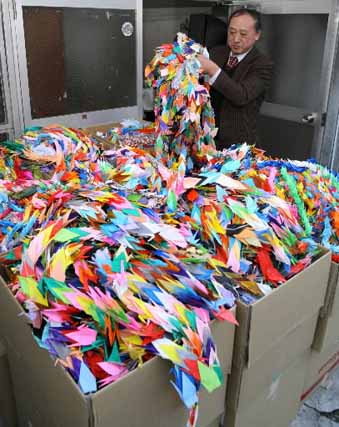200,000 paper cranes delivered to Hiroshima to support A-bomb survivors
Feb. 26, 2008
by Hiromi Morita and Takashi Kawasaki, Staff Writers
Approximately 200,000 paper cranes folded by people from throughout Japan, hoping for a sweeping revision of the certification criteria for A-bomb diseases, were recently delivered to Hiroshima. Supporters of the class action lawsuits being heard at Hiroshima Superior Court and District Court then brought the paper cranes to the Children’s Peace Monument in Peace Memorial Park on February 16. They will also begin collecting signatures from the public to bolster their position that the revision of the certification criteria, which has been hotly debated, must truly meet the needs of A-bomb survivors.
The paper cranes, packed in 25 cardboard boxes, were collected mainly by young people in Japan starting last October. In December, the plaintiffs of the class action lawsuits gathered in Tokyo, encircled the Ministry of Health, Labor, and Welfare, and demanded a speedy settlement of their cases as they held the paper cranes in their hands.
With the government’s revision of the certification criteria now in its final stage, the paper cranes were sent to supporters in Hiroshima so that the citizens’ message of “No more A-bomb victims” can once again be conveyed from Hiroshima.
On February 16, about 40 people gathered in front of the Children’s Peace Monument and reported the current state of the lawsuits brought against the national government by approximately 300 people from 23 prefectures. They also expressed their determination to demand an appropriate revision of the certification criteria to satisfy the needs of A-bomb survivors and they made an offering of the cranes to the monument.
Makoto Matsumoto, 61, Secretary General of the Hiroshima Council Against Atomic and Hydrogen Bombs, one of the organizations supporting this action, gazed at the colorful cranes and said, “These cranes embody the wish for peace from people around the country. We would like to send this message back out to the world from Hiroshima.”
Approximately 200,000 paper cranes folded by people from throughout Japan, hoping for a sweeping revision of the certification criteria for A-bomb diseases, were recently delivered to Hiroshima. Supporters of the class action lawsuits being heard at Hiroshima Superior Court and District Court then brought the paper cranes to the Children’s Peace Monument in Peace Memorial Park on February 16. They will also begin collecting signatures from the public to bolster their position that the revision of the certification criteria, which has been hotly debated, must truly meet the needs of A-bomb survivors.
The paper cranes, packed in 25 cardboard boxes, were collected mainly by young people in Japan starting last October. In December, the plaintiffs of the class action lawsuits gathered in Tokyo, encircled the Ministry of Health, Labor, and Welfare, and demanded a speedy settlement of their cases as they held the paper cranes in their hands.
With the government’s revision of the certification criteria now in its final stage, the paper cranes were sent to supporters in Hiroshima so that the citizens’ message of “No more A-bomb victims” can once again be conveyed from Hiroshima.
On February 16, about 40 people gathered in front of the Children’s Peace Monument and reported the current state of the lawsuits brought against the national government by approximately 300 people from 23 prefectures. They also expressed their determination to demand an appropriate revision of the certification criteria to satisfy the needs of A-bomb survivors and they made an offering of the cranes to the monument.
Makoto Matsumoto, 61, Secretary General of the Hiroshima Council Against Atomic and Hydrogen Bombs, one of the organizations supporting this action, gazed at the colorful cranes and said, “These cranes embody the wish for peace from people around the country. We would like to send this message back out to the world from Hiroshima.”








